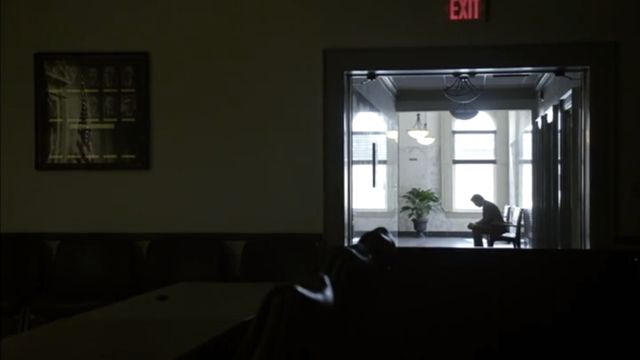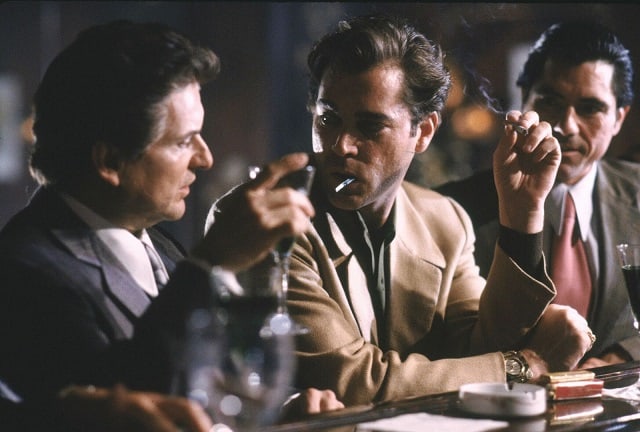Rectify Season 2, Episode 8, “The Great Destroyer”
Written by Scott Teems (story) & Ray McKinnon (teleplay)
Directed by Billy Gierhart
Episode 9, “Until You’re Blue”
Written by Victoria Morrow & Scott Teems
Directed by Seith Mann
Episode 10, “Unhinged”
Written by Ray McKinnon & Kate Powers
Directed by Stephen Gylenhall
(Note: as a primer for Rectify‘s third season premiere, Randy revisited the final three episodes of season two.)
There’s nothing more important than family on Rectify – and I’m not just talking about Daniel Holden, or even the Holden family in general. The closing episodes of Rectify‘s haunting, beautiful second season are all about breaking down the various families of Paulie, be it the Holdens, the Willis’s, or even something more abstract, like the law enforcement characters, or the general population of Paulie. As Senator Roland Foulkes pushes and pushes to get Daniel’s case reopened, everyone in Georgia finds themselves divided on the issue of Daniel’s innocence; and as Daniel himself begins to come to terms with what he did (and didn’t do, more specifically), the last few episodes of Rectify slowly go about demolishing the world it built in its first 13 episodes.
From the moment Daniel wakes up in “The Great Destroyer”, Rectify changes: as it becomes more plot-focused pushing characters into the next phase of the narrative, the second season of Rectify found itself in new emotional places for people to explore. Jon’s shortcomings as a lawyer, Amantha’s search for purpose in life… all of these stories are grounded in Daniel’s own self-exploration, causing the others to look inward, even as they openly express what they think Daniel should do about the plea deal the D.A. and the senator put on the table. This idea in itself is the great catalyzer of the season’s end game; as the details of what happened to Hanna slowly come to the surface, every major and minor character of Rectify comes face to face with a question they haven’t asked themselves in a very long time: what do you want from life?
There are so many powerful moments that spring from this, as series creator Ray McKinnon and his brilliant writing staff carefully orchestrate every narrative impasse “Unhinged” leaves us with. Some of these, like Jared trying to learn about his brother, are more muted, lingering in the background while other, louder stories play out, all orbiting around the increasingly confused and frustrated Daniel, himself considering what a life after the case may be, something seen in “Until You’re Blue” and “Unhinged” both. Of course, that comes with him realizing that him and Tawney will never be together, even after she has a miscarriage (again, loss of family becomes a theme) and separates from Ted Jr. (himself at a crisis of masculinity with his career, and the perceived threat to his marriage), and those scenes, as always, provide the most contemplative, emotionally engaging moments of the season, led by their sad dance in the motel room that closes “Until You’re Blue”, the one time their two souls could operate on the same vibrations, if only for a fleeting moment.
As much as it is a theme for the rest of the series, the inner reflections of these final episodes are really what drives the drama as the show builds to its climatic piece, the plea meeting between Daniel, Jon, Sondra, and the evil Senator. This is no easy task, considering the dramatic weight of its main story, teasing the audience with a look into the past we never expected; watching Rectify fill out the edges of its world around that one plot, however, brings the background of Paulie and its people to life. Look at how important a character Ted Sr. is able to become in those final episodes, rallying around Janet as she struggles to contemplate life without her son once again, in the broken kitchen that he was never able to completely fix (well, save for a little help from ol’ Lezlie).
Giving dimension to these characters is really what adds weight to that climatic moment; for all intents and purposes, what Daniel actually says in that meeting doesn’t matter to the large portion of the show’s small audience; so in order to heighten that drama, “Unhinged” connects that very moment to the journeys of every single other character, down to little notes like Jared sneaking into Hanna’s bedroom, or Ted Jr. struggling with losing control of his marriage and career (his rim business is staying alive through smoke and mirrors, and Ted Jr. gets into a fight with a man whose rims he tries to repo illegally in the middle of the night). More so, every decision to come in “Unhinged” is affected by whatever decision Daniel makes in that conference room; and as Daniel suffers through a memory he’s long tried to forget, Rectify begins to disassemble its world.
By the time Daniel’s done talking, having confessed to watching Hanna have group sex and then comforting her corpse, everything is unraveling. Ted Jr., disillusioned by his wife leaving, goes to the increasingly doubtful Daggett about pressing charges for Daniel’s assault on him in the tire store; Amantha breaks up with Jon, and recognizes she no longer has a path in life; and Ted Sr. stands strong by his wife’s side, even after she apologizes for never being able to love him the way he deserved. Like Daniel’s confession – and then, coerced, seemingly false confession – there’s a balance between resolution and conflict, all of which are pushing characters in opposite directions from each other, ending the season without a single resolution, the final image Daniel sitting outside that conference room, head in his hands, isolated once again in a tiny box from the world around him.
Rectify‘s supersized second season may end up being an anamoly (its third season begins tonight, and returns to the six episode length we saw in season one) – but it was an important step in filling out Rectify‘s world, giving dimension to characters (like Shondra, whose empathy comes through in that final meeting) while refusing to exit on a satisfying note, ending the season at a natural turning point for every character and story. While this longer episode length certainly strained in small pockets to fill its length, it also allowed Rectify to push beyond Daniel’s contemplation on the world and explore others: those three dimensions could pay huge dividends in the soon-to-debut third season, allowing Rectify to narrow its lens again, refocusing its attention on its central character and the philosophic explorations that come with it. Those final three episodes may be as dramatic as Rectify ever gets; and even during that, it never lost sight of its cinematic tilts or narrative priorities, as quiet and observant as it is active in those final three hours, ending Rectify‘s experimental, lengthier second season on an absolute high note. – Randy






